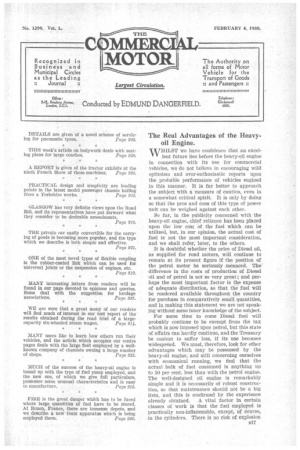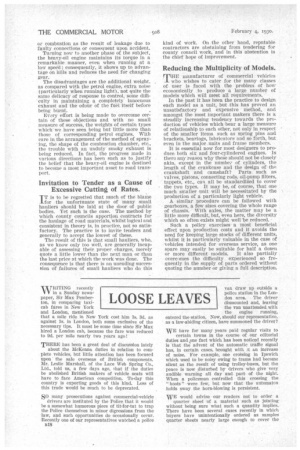The Real Advantages of the Heavyoil Engine.
Page 43

Page 44

If you've noticed an error in this article please click here to report it so we can fix it.
WHILST we have confidence that an excellent future lies before the heavy-oil engine in connection with its use for commercial vehicles, we do not believe in encouraging wild optimism and over-enthusiastic reports upon the probable performance of vehicles engined in this manner. It is far better to approach the subject with a measure of caution, even in a somewhat critical spirit. It is only by doing so that the pros and cons of this type of power unit can be weighed against each other.
So far, in the publicity concerned with the heavy-oil engine, chief reliance has been placed upon the low cost of the fuel which can be utilized, but, in our opinion, the actual cost of fuel is not the most important consideration, and we shall refer, later, to the others.
It is doubtful whether the price of Diesel oil, as supplied for road motors, will continue to remain at its present figure if the position of the petrol motor be seriously menaced. The difference in the costs of production of Diesel oil and of petrol is not so very great ; and perhaps the most important factor is the expense of adequate distribution, so that the fuel will be rendered available throughout the country for purchase in comparatively small quantities. and in making this statement we are not speaking without some inner knowledge of the subject For some time to come Diesel fuel will probably continue to be exempt from the tax which is now imposed upon petrol, but this state of affairs can hardly continue, and the Treasury be content to suffer loss, if its use becomes widespread. We must, therefore, look for other advantages which may be possessed by the heavy-oil engine, and still concerning ourselves with economical running, we find that the actual bulk of fuel consumed is anything up to 50 per cent. less than with the petrol engine. The well-designed oil engine is remarkably simple and it is necessarily of robust construction, so that maintenance should not be a big item, and this is confirmed by the experience already obtained. A vital factor in certain classes of work is that the fuel employed is practically non-inflammable, except, of course, in the cylinders.. There is no risk of explosion
or combustion as the result of leakage due to faulty connections or consequent upon accident.
Turning now to another phase of the subject, the heavy-oil engine maintains its torque in a remarkable manner, even when running at a low speed ; consequently, it shows up to advantage on hills and reduces the need for changing gear.
The disadvantages are the additional weight, as compared with the petrol engine, extra noise (particularly when running light), not quite the same delicacy of resPonse to control, some difficulty in maintaining a completely innocuous exhaust and the odour of the fuel itself before being burnt.
Every effort is being made to overcome certain of these objections and with no small measure of success, the weights of certain types whichwe have seen being but little more than those of corresponding petrol engines. With care in the arrangement of the method of spraying, the shape of the combustion chamber, etc., the trouble with an unduly" smoky exhaust is being reduced. In fact, the progress made in various directions has been such as to justify the belief that the heavy-oil engine is destined to become a most important asset to road transport.




















































































































